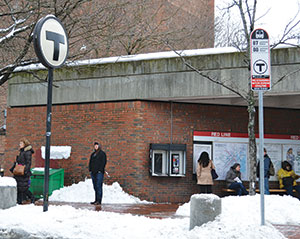
The MBTA is faced with some unappealing choices in order to remain solvent. – Photo by Harry Kane.
By Harry Kane
A 33 percent increase in transportation fares, or a significant reduction in transit service may be implemented after July 1 unless additional funding is provided by a state bailout.
Several options to alleviate an estimated $140 million deficit crippling the MBTA were proposed during a committee meeting last week. The most controversial is the potential 33 percent fare hike.
Somerville commuters who use the T will feel the impact of the fare increase in their wallets if the bailout from the Statehouse is unsuccessful.
Alderman Jack Connolly shares the frustration of the everyday T commuter.
If the fares are increased, Connolly said, people might visit Davis Square less often. Higher fares could translate to less ridership on the T.
“Instead of coming twice a week, those trips might become limited, might be once every two weeks,” he said.
From his office window on College Street, Connolly can see T passengers coming and going for business and pleasure.
“There’s only so much discretionary income that people have,” Connolly said. “If that has to be eaten away by increased costs and basic needs like basic transportation, those folks are going to have no other recourse.”
The new transportation fare hike is yet another attempt at coping with the economic downturn, a crisis that has spiraled out of control, saddling the bay area with a chronic transportation dilemma.
During 2012 there was a 23 percent increase in fares. This year the MBTA needs more.
Currently the cost of riding the bus is $1.50, and $2 on the subway. Under the 33 percent fare hike, both will be increased. The bus fare and subway fare would rise to $2 and $2.60, respectively.
A second solution would lessen the fare hikes to 15 percent, but would include the elimination of some nighttime and weekend transit service. In this scenario approximately 30 bus routes would go out of service within the bay area.
Gov. Deval Patrick’s administration recently proposed an increase in state income taxes to help pay for education and transportation programs. The $1.9 billion in revenue generated from a change in taxes would easily provide a fix to the MBTA crisis.
On Tuesday, March 12 a statewide coalition of united T riders convened at the State House to rally for investment in the MBTA.
Diana Bell is a senior organizer for the Community Labor Union (CLU) and was at the rally on Tuesday. Bell is also a representative of Public Transit – Public Good, an organization that aims at making public transportation affordable and accessible for everyone.
“Bottom line is that these sort of short-term regressive fixes, that these fare hikes represent, are fundamentally not working,” Bell said.
According to Bell, if fare increases and service cuts are implemented, there will be a “devastating effect” on low-income T riders, commuters with special needs, the elderly and the disabled.
Leader of the TRiders Union, Stuart Spina, disagrees with the 33 percent fare hike.
“We cannot afford to continue putting this on the backs of the most vulnerable riders and workers,” Spina said. “We need legislation that fully funds public transit across the state.”
There’s no guarantee of a bailout, according to MassDOT officials.
If the proposed state tax increases are not well received by legislative leaders, the 66 year-old MBTA organization will be forced to make drastic cuts or charge higher fares in order to rectify the budget shortfall.















Reader Comments